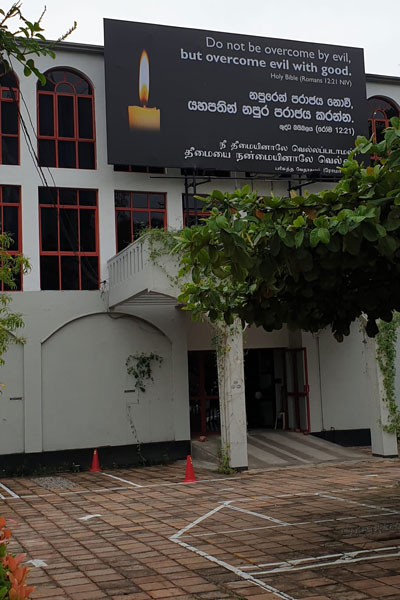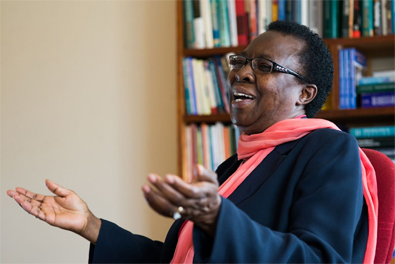
Because Langham is called to serve in places where God’s people are under pressure and in poverty, our leaders and volunteers often find themselves living and serving in places of danger.
Sri Lanka is one of these places, and we continue to grieve the hard news of suicide bombers blowing through 3 churches and several hotels, killing and wounding hundreds of Christians in the midst of worship on Easter Sunday.
When tragedy strikes the body of Christ, it impacts all of God’s people. But we can take comfort in the words of peace and hope being proclaimed by those involved in Langham’s work training and resourcing biblical leaders in Sri Lanka. We wanted to share some of these messages with you. Read them below and please join with us in praying for the safety and boldness of all our brothers and sisters in Sri Lanka and other hard places around the world. We pray that as God’s Word is faithfully taught, His church would mature and bring the hope of Christ to the hurting.
“Christians. . . Do not waiver.”
We received the following reflection from a sister in Christ (and former student of a Langham-trained leader) in Sri Lanka. As the bombs were detonating in churches across Colombo, she was sitting in the pew of her own church—holding tight to her small son as news of nearby bombings streamed in. She says:
“Christians, do not lose hope. Do not waiver. We do not fight against flesh and blood, but principalities of darkness. Where there is darkness, may you be the light. . . Pray for this nation, pray for our armed forces, pray for the families grieving, pray for the Muslims who fear what tomorrow may bring, pray for our government. Prayer is a weapon. Do not put it down in your brokenness, but use it now more than ever. Jesus shed His blood so that you and I can go to the Father in such a time as this.”
A Sign of Hope; an Invitation to Prayer
 *Manura, who coordinates Langham’s pastor-training efforts and leads a media company dedicated to Bible teaching in Sri Lanka, shared this sign that had been posted outside his building. He invites us to:
*Manura, who coordinates Langham’s pastor-training efforts and leads a media company dedicated to Bible teaching in Sri Lanka, shared this sign that had been posted outside his building. He invites us to:
-Pray for the bereaved families and for the injured and those serving them in the hospitals and through other services.
-Pray for the authorities that they will act with speed and resolve to get to the bottom of this and restore peace.
-Pray that no one will try to manipulate this situation for narrow political or other agendas.
-Pray that we will stand together as one nation.
-Pray that the church will be an example and vehicle of the love, forgiveness and hope that is so central to the Easter message.
Who Shall Separate Us?
The following reflection is from Ivor, a theological leader in Sri Lanka who is principal of a seminary and involved in Langham’s pastor-training work in the region. He writes:
“Our social landscape appears to have transformed in an instant. Once we get over the shock, it’ll be time to roll up the proverbial sleeve and get engaged in the work cut out for the Church. We will need effective pastoral care for congregations, psycho-social support for Christian children, and a whole new way of thinking about security for Christian events and gatherings. Then there is the need for biblical teaching: to enhance our understanding of persecution and our theology of suffering; to deepen our commitment to evangelism; and to develop a Christian mind for peace-making and grace-sharing. Many have expressed their readiness to support the families of the bereaved and the injured. The churches are already working on rebuilding their damaged properties. There is an amazing resilience and solidarity that is sweeping through the wider society. Pray that it will grow.
In all things God works for the good of those who love God and are called according to his purpose. . . What a comfort to know and feel the power of the truth of what Paul continues to say in Romans 8:28-39: “Who shall separate us from the love of Christ? Shall trouble or hardship or persecution or famine or nakedness or danger or sword?”
Read the full text at Christianity Today.
“This holding of hands in our sorrow. . . “
We just received this reflection from Langham Scholar Dr. Gladys Mwiti of Kenya, a theological leader equipped with support from Langham and now a global leader in trauma and crisis counseling. She was on the frontlines during the 2013 Westgate mall shootings in Nairobi and in 2015 at the attacks at Garissa University, and has multiplied herself into the training of hundreds of counselors who then cared for thousands of victims. She shares:

Langham Scholar Dr. Gladys Mwiti is a leading expert on trauma care and counselling.
A senseless attack like the recent Sri Lanka terrorist massacre leaves many innocent people wounded and confused. Why so much destruction? Why on Easter weekend? Where is God’s hand of protection? The rest of the Christian world has stopped to pray with Sri Lanka. For me, all the way from Kenya, I’ve always felt a close connection to that beautiful island country because one of my favorite high school teachers, a soft-spoken missionary woman, came from Sri Lanka, then Ceylon. The recent happenings made me very sad.
When storms blow and destruction comes, I am always convinced that, just like the human body that begins to heal itself when it is hurt, the wounded people have God-given resources among themselves to begin the journey towards healing and wellness. First, they have God’s Word that speaks of His Presence – “When you walk through the waters, I will be with you,” (Isaiah 43:2). Then we have one another – already linked within families, the Church, neighborhoods, the workplace. These linkages boost and enhance mutual care because, already, there is cultivated trust. Of course, trust for anyone who is different among us is shaken because the attacker may be a member of my neighborhood. At such times, we should guard against paranoia as well as feelings of revenge, because we know that Jehovah knows and in spite of everything that has befallen us, Jehovah sees.
This holding of hands in our sorrow, brokenness, and mourning will enhance truth-telling as we decide what to share with other people without causing panic. Walking together will also inform our decision–making skills to augment more specific intervention efforts that will promote safety, calming, efficacy, hope, and connectedness in the aftermath of this mass trauma. Even before external help arrives, the community and Church leadership will already be providing a sense of safety—calming the distraught, enhancing a sense of self- and community efficacy, encouraging connectedness, and spreading hope that comes from the Only One who knows. From the midst of deepest pain, He who knows how to cry: “Father, forgive them, for they do not know what they are doing,” (Luke 23:34).
May the above reflections draw your heart into prayer for our brothers and sisters in hard places around the world. Thank you for how you come alongside in our work lifting up leaders who share hope from God’s Word in these same regions.
Learn more about Langham’s work training and resourcing the global church.
Make a gift that brings hope where it’s needed most.
